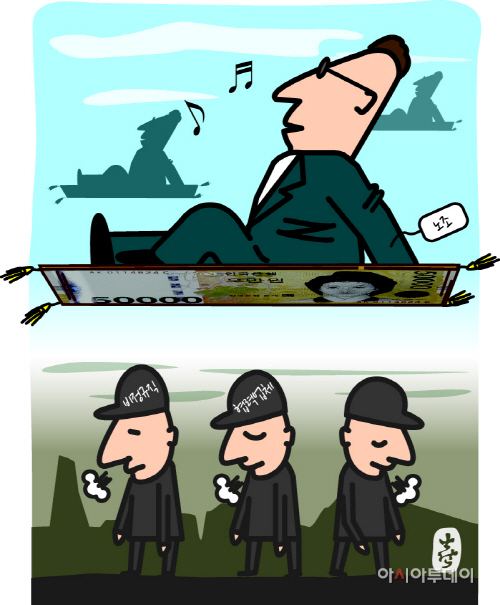 |
By AsiaToday reporter Park Ji-eun
Kia Motors' wage lawsuit is hitting the South Korean automobile industry. After the union of Kia Motors Corp. partially won in its lawsuit against the company, Renault Samsung Motors Corp.'s labor union has rejected this year's tentative wage agreement which was expected to complete smoothly. It seems that the union of Renault Samsung agree that its wage deal should be renegotiated while looking at the progress of wage increase for Kia Motors' union. GM Korea's labor union has also warned of a strike in autumn. Significant attention is being focused on whether the average wage of Kia Motors union will surpass 100 million won (US$89,245). In this case, the wage gap between companies with belligerent unions and their subcontractors is likely to widen further.
◇ Will Kia's average annual wage surpass 100 million won?
According to the automobile industry on Sunday, Kia Motors union will negotiate with the company during this week about whether to keep aggregate wages the same even if regular bonuses and other charges are regarded as normal wages.
Kia Motors previously asserted that the union and the company should set a total wage range. The company asked the union to keep the workers' total salaries the same even if bonuses are regarded as normal wages. The proposal reflects the company's concern about a sudden leap in its total spending on labor costs.
However, the union's position on this issue is firm. Kim Seong-rak, head of Kia's union, revealed Thursday, "We can't agree with the proposal of the company. If the company continuously refuses to recognize the law, they will have to deal with more serious labor-management conflict than in the past six years."
According to a business report released by Kia Motors, the company's average annual wage for production and office workers was approximately 96 million won (US$85,676) last year. Among domestic companies, Samsung Electronics, SK Telecom and Hyundai Motors have an average salary of more than 90 million won. Some say if the verdict in the Kia case is upheld by the Supreme Court, the average annual salary of Kia employees will exceed 100 million won. If the ruling is finalized, allowances for night shifts and overtime and stipends for unused annual leave, which are calculated on the basis of normal wages, will increase as well.
Of course, most observers believe that Kia's management will lower incentives or cut overtime work in order to restrain the rapid increase of its total spending on wages. In this case, conflicts between the labor union and the management are likely to intensify.
◇ Subcontractors and SMEs feeling an even greater sense of deprivation
Industry analysts point out that wage lawsuits can lead to deprivation for workers at small-scale workplaces without unions. It's not easy for workers in a company with a weak union or no union at all to bring up the wage problem and file a suit.
The bigger the company and the stronger the union, the greater the benefit is expected from ordinary wage lawsuits. If this kind of situation is repeated, the wage gap between workers in big companies and workers in SMEs and temporary workers will widen. In fact, wage lawsuits have been proceeded mainly on fulltime employees of large companies with powerful unions. The examples include Hyundai Motor, Kia Motors, Hyundai Heavy Industries, Asiana Airlines, Hyundai Wia, Kumho Tire, and Hyundai Mipo Dockyard.
According to a report on employment and employment types released y the Ministry of Employment and Labor, a temporary worker of a large company earns 65% of what a full-time employee of a large company gets paid. Besides, a full-time employee and a temporary employee of SMEs earn only 49.7% and 35%, respectively.
Hyundai and Kia's subcontractors seem complicated with the result of Kia union's wage lawsuit. A representative of one of Kia's subcontractors said, "Subcontractors who try to borrow additional money from banks undergo many hardships whenever they hear the news that the sales of Hyundai and Kia cars are declining. It's nice to hear that Kia workers are now able to work in a better working environment, but I'm afraid that the company will squeeze money for its partners due to the rise of labor costs."
#worker #pay gap #Kia Motors #union #court
Copyright by Asiatoday
Most Read
-
1
-
2
-
3
-
4
-
5
-
6
-
7





















